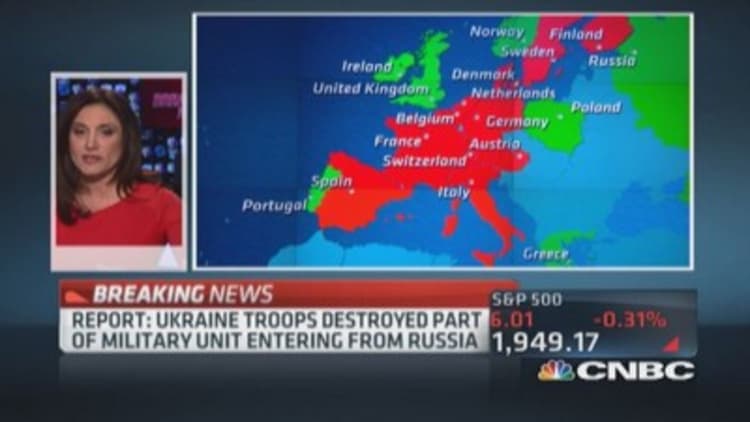Traders immediately jumped into a defensive posture ahead of the weekend, selling stocks and adding to bond positions after Ukrainian artillery destroyed part of a Russian armored column inside Ukraine.
Stocks had been higher with global equities and yields had been carving out a new low before news of the attack. But after the reports, the Dow wiped out more than 100 points and was trading lower. The 10-year yield broke down to 2.31 percent, a level last seen 14 months ago.
Read MoreUkraine attacks Russian incursion, jolting markets
Oil, which has barely reacted to the Ukraine situation in the past, jumped 1 percent.

The VIX, the CBOE's volatility index, jumped 7 percent. Jon Najarian, CNBC contributor and co-founder of OptionsMonster, reports that there were massive VIX trades just minutes ahead of the reports on the attack.
After the reports, traders added puts on the S&P 500. Markets had been paying little heed to Ukraine risks this week, instead focusing on positives like remarks from Russian President Vladimir Putin that he didn't want bloodshed.
Initial reports—around 10:30 a.m. EDT—were confusing, with traders assuming the humanitarian convoy that left Russia earlier in the week, was hit by Ukrainian troops. But a later story, quoted Ukraine President Petro Poroshenko as saying the target was a Russian armored column that entered the country overnight.
Read MoreRussian aid convoy checked; NATO spots 'incursion' into Ukraine
"Whether it's the humanitarian convoy or a secret convoy that tried to sneak in overnight, what's the difference. This is not calming down. Plus, you're going into the weekend and people are sniffing out what's going to happen next," said Peter Boockvar, chief market analyst at Lindsey Group. "We've been following Europe, Germany's down. As they go, we go."
European stocks were lower on the reports and Germany's DAX was down 1.4 percent.
"In and of itself, this may not mean anything," said Boockvar. "We're beginning to see economic repercussions from what's going on with Russia and that's the concern. The European economy is fragile and anything that damages trade is a concern."
Ukraine Foreign Minister Pavlo Kilmkin said he will meet Sunday in Berlin with Russian Foreign Minister Sergei Lavrov and foreign ministers of France and Germany.
The euro continued to hold slight gains against the dollar in afternoon trading.
"We're all trying to understand these headlines. The market is already quite short the euro," said one currency trader. " I think if there was a long euro position in the market, we would see an unwind and you would see more weakness."
George Goncalves, head of rate strategy at Nomura, said the 10-year yield Treasury has now broken its range, after trading between 2.35 and 2.65 for months. He said a short squeeze took the yield to a June, 2013 intraday low, and it could easily touch 2.25 percent.
"Public enemy number one is the Treasury. The people who are buying it are the ones that sold it. This is not people embracing the low yields and saying: 'This is value,'" he said.
John Canally, market strategist and economist at LPL Financial, said the market was trading nervously ahead of the weekend and the news has come in a void, where there's little earnings or other news. But he does not expect the situation to be a long-term negative, unless it escalates as in a shooting war.
"Right now, you're in the summer doldrums and not much else is going on so the market is going to be hyper-focused on the geopolitical stuff," he said.
—By CNBC's Patti Domm


